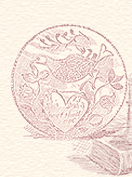Ihr liewe
Leit:
Letscht Woch hen mer gelese ass veralders es Kann mit Fleggel
gedrosche waar un der Weeze mit de Geil. Un mer hen gelannt was en Fleggel iss
wie mer aus em Swope seim Schtick 'Mit Fleggel Dresche" gelese hen. Heit mache
mer weider mit dem Schtick:
"Ich kann heit noch erinnere wie ich en gleener Bu waar un bin die
Leen nei vun der Schtrooss zu unserer scheier. Mei Daadi un der Gnecht waare
am Fleggeldresche. Die hen gut Zeit ghalde. Wann em eende sei Fleggel nunner
iss uff die Blanke (vun der Dreschdenn) hot der anner sei Fleggel in die Heeh
gezogge.
"Des hot als 'Bump, berump gemacht, graad so schtarrig ass wann mer
langsaam zeehle deet. Ich hab gewinscht ich keent aa helfe. Es hot so leicht
geguckt.
"Awwer des Handwarrick hot gelannt sei misse. Wann zwee draa waare,
hen sie teit en ennanner nunnergschlaage. Un sie hen nanner nie gedroffe. Un
wann mer sich net in acht genummer hot, dann hot mer sich selwer hinnewedder
sei Kopp gschlaage, ass mer die Schtanne sehne hot fliege beim helle Daag. Ya,
es Fleggeldresche hot gelannt sei misse."
Un in seim Schtick "Dresche" hot der Swope gschriwwe:
"In meinre Zeit hot's alle Sadde Wege gewwe fer zu dresche. Ich hab
iewen helfe Weeze ausreide im Scheierdenn uff de Geil. Ich hab eener geridde
un en annerer gfiehrt. Ebmols hen zwee geridde, noh sin vier Geil ums Denn rum
geloffe.
"Ihre scharrefe Eise hen die Kanne aus der Schprau kumme mache. Mir
hen noh als es Schtroh runnergenumme mit der Schiddelgawwel. Noh waar nix me
him Denn ass Schprau un Kanne. Noh hen mir des iwwer die Windmiehle. Sell hot
die Schprau hinnenaus geblose.
"Die Bauere heidesdaags dresche nimmi wie mir als hen. Sie meehe
die Frucht mit me Combine. Sell drescht graad uffem Feld. Noh schtaabt's net
so."
immi wie ver alders? Der Fischer hot schunn in seim Gedicht
gschriwwe (ya, schunn1878) ass die Zeide, sie sin sich am Verennere:
Wie lonesome iss's im Aerntfeld nau!
Doch geht die Arrewet schmaerder;
'S watt nix meh gemeeht nau mit der Sens,
As yuscht en Gmaad so an der Fens,
Der Reaper drin zu schtaerde.
O, was en Kumpanie alleweil!
Zwee Mann, zwee Esel un zwee Geil!
Awwer mer gewwe em Buhneschtiehl's letscht Watt. In seim Schtick
"En Bauersbu" saagt er uns ass er aa uff der Bauerei gschafft hot wie er yung
waar, awwer
"Es waar gewiss net viel Blessier drin, un ich winsch mich nimmi
zerrick, awwer doch binnich froh ass ich emol en Bauerbu waar, fer ich hab
datt gelannt was schaffe iss, un aa nimmand zu verachde ass schaffe dutt."
Macht's gut,
Der Alt Professer
|
Dear people:
Last week we read that in olden times the rye was threshed with
flails and that the wheat was threshed with horses. And we learned what a
flail is when we read from Swope's piece "Threshing With Flails." Today,
we will continue with that piece:
"I can still remember today how when I was a little boy and went
into the lane from the street to our barn. My daddy and the farm hand were
threshing with flails. They kept good time together. When the one's flail
went down on the planks (of the threshing floor) the other raised his
flail.
"That used to go 'bump, berump,' just as fast as if you were slowly
counting. I wished that I could also help. It looked so easy.
"But that craft had to be learned. When two were at it, they hit
down rather close to one another. And they never hit each other. And if
one were not careful, then one hit himself in back of his head, so that
one saw the stars fly in bright daylight. Yes, threshing with a flail had
to be learned."
And in his piece "Threshing" Swope wrote:
"In my time there were all sorts of ways to thresh. I even helped
ride out wheat in the threshing floor on horses. I rode one and led the
other. Sometimes two of us rode, then four horses walked around on the
threshing floor.
"Their sharp horseshoes made the kernels come out the chaff. We
then took down the straw with the 'shaking' fork. Then nothing more was in
the threshing area except chaff and kernels. Then we put that over the
wind (winnowing) mill. That blew the chaff out the back.
"The farmers these days don't thresh any more the way we used to.
They mow the grain with a combine. That threshes right on the field. Then
there isn't so much dust."
No longer as in olden times? Fisher had already written in his poem
(yes, already in 1878) that the times, they are achanging:
How lonesome it is in the harvest field now!
But work goes more quickly;
Nothing is mowed now the scythe,
Except just a swath at the fence,
To start up the reaper.
Oh, what a company now!
Two men, two mules and two horses!
But we'll give Boonastiel the last word. In his piece "A Farmboy"
he tells us that he too worked on a farm when he was young, but
"There was certainly not much joy in it, and I don't wish myself
back there, but nevertheless I am happy that I was once a farmboy, for I
learned there what work was, and also not to despise anyone who works."
Take care,
The Old Professor
|













